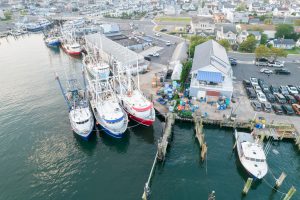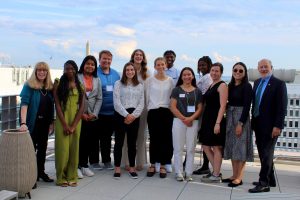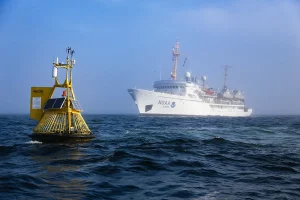IAEA Environmental Laboratories
Closing date: 3 December 2017. Position open for US citizens.
Note: This position is part of an IOC-UNESCO/IAEA- collaboration to support GOA-ON.
Organizational Setting
The Department of Nuclear Sciences and Applications implements the IAEA’s Major Programme 2, “Nuclear Techniques for Development and Environmental Protection”. This Major Programme comprises individual programmes on food and agriculture, human health, water resources, environment, and radiation technologies. These programmes are supported by laboratories in Seibersdorf,
The Radioecology Laboratory’s mission is to improve knowledge about the
Main Purpose
Reporting to the Laboratory Head and Professional Staff, the Associate Research Scientist, (Programme Support) will facilitate and assure effective and efficient implementation of all GOA-ON (Global Ocean Acidification Observation Network) activities for the International Coordination Centre (OA-ICC), a PUI project that promotes, facilitates and communicates global activities on ocean acidification.
The Associate Research Scientist, (Programme Support )will enable the provision of the scientific and technical expertise and related support for the OA-ICC and GOA-ON and for ensuring the contribution of the GOA-ON to the achievement of SDG Target 14.3.
Role
Under supervision of the Head of the Radioecology Laboratory, the Associate Research Scientist (Programme Support) is: (1) a technical specialist assisting in planning and implementing of all GOA-ON activities, (2) a network facilitator promoting global integration and coordination for the GOA-ON, and (3) a communicator preparing and presenting results to the broader community through reports and scientific publications.
Partnerships
The Associate Research Scientist (Programme Support) facilitates and assures effective and efficient implementation of all GOA-ON activities. The incumbent works with the GOA-ON EC (Executive Committee) to enhance collaboration with other international organisations such as UNESCO-IOC, UNEP (United Nations Environment Programme), GEF (Global Environmental Facility), UNDP (United Nations Development Programme), and other international programmes, to ensure the effective utilisation of technical inputs to the design and implementation of the OA-ICC and GOA-ON activities. The Associate Research Scientist (Programme Support) also develops and builds networks with scientists and technical staff from Member State laboratories in training activities related to analytical methodologies for measuring parameters of climate change and ocean acidification in the marine environment.
Functions / Key Results Expected
- Act as scientific secretary for meetings, including the preparation of documents and reports to the EC as needed.
- Support the Co-Chairs by coordinating and networking to ensure GOA-ON’s interface with relevant IAEA and IOC-UNESCO programmes, such as the OA-ICC, Global Ocean Observing System (GOOS) and the IOC’s Oceanographic Data and Information Exchange (IODE), and other relevant working groups.
- Document the contributions of GOA-ON to the formal SDG Target 14.3 delivery, while ensuring that reporting is captured in the contributions of IAEA and IOC-UNESCO to the SDGs process.
-
Provide evaluation and assessment of best scientific practices to support the Executive Committee of GOA-ON’s to assure
efficient implementation of SDG Target 14.3, withdue connection to OA-ICC/IODE/JCOMM/GOOS data management activities. - Contribute to the development of the GOA-ON data portal to ensure that it reflects the expected programme outcomes against the SDG indicator 14.3.1.
Knowledge,
- Achieving results
- Communication
- Planning and Organizing
- Teamwork
- Analytical thinking
- Knowledge sharing and learning
- Technical/scientific credibility
- Chemistry/Marine Geochemistry
- Bioscience/Biogeochemistry of Carbon Cycle
- Bioscience/Climate Change and Ocean Acidification
- Public Information and External Relations/Public Information and Communication
Education, Experience and Language Skills
- Bachelor’s Degree: University degree in environmental sciences (i.e. biology, radioecology, oceanography, marine geochemistry).
- Minimum of 2 years of experience in the study of oceanography, climate change science and/or marine sciences.
- Publication of research in peer-reviewed, scientific journals is an advantage.
- Fluency in spoken and written English is essential; working knowledge of another official IAEA language (Arabic, Chinese, French, Russian and Spanish), especially French, an asset.
More information here (NA201703-P2).





